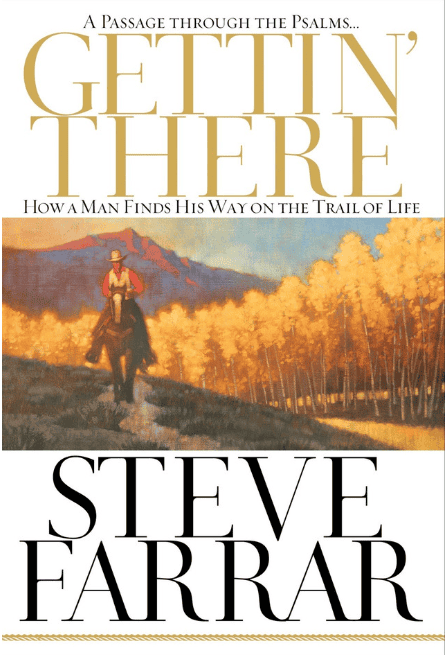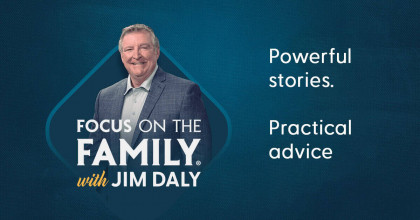John Fuller: The late great pastor Steve Farrar explains the practical applications of Psalm 23.
Steve Farrar: You need a shepherd that can go. You’ve got young kids, you’ve got grandkids. You need a shepherd that can go with those kids 24 hours a day, seven days a week. Doesn’t matter where they are, he’s with them and he’s around them.
John: What a comforting thought. And you’ll hear more encouragement today on Focus on the Family with Jim Daly. I’m John Fuller.
Jim Daly: A lot of us are familiar with Psalm 23, but today Steve Farrar is going to take it apart, verse by verse, and you’re gonna hear things you’ve never heard before. This is a very entertaining message from a brilliant teacher, especially when talking to men. After 15 years as a pastor, Steve focused on men’s ministry for over 30 years and conducted over 600 men’s conferences across North America until his untimely death in 2022. He was just 72 years old. He was also a bestselling author of several books, including Gettin’ There: A Passage Through the Psalms, which is a great fit with today’s content.
John: I’d agree, and you can find out more about the book Gettin’ There when you stop by, focusonthefamily.com/broadcast. And this recording comes from way back 2001. Steve was filling in for Chuck Swindoll at First Evangelical Free Church in Fullerton, California. And here now the late Steve Farrar on Focus on the Family with Jim Daly.
Steve: And I was sitting over there thinking, uh, about 20 years ago, 25 years ago, I was a rookie pastor in Northern California. And I remember, uh, a conference came up that I was going to attend on a weekend in Los Angeles, and it was a Friday, Saturday deal. And I thought, “Oh yeah, that’ll work great, and I’ve got some time coming, I can take that.” And then I thought, “You know what? I’m gonna steal over Sunday and I’m gonna go hear Chuck Swindoll at that new church, that new, they got a new building at Fullerton Church. I’m going down and hear him.” And I, I thought, “Oh, this is gonna be great.” Had a great conference and, you know, got up early to get a seat at church on Sunday and get in there, open the bulletin and somebody else was preaching.
Audience: (laughs).
Steve: Some of you, you know what I’m talking about.
Audience: (laughs).
Steve: You, you came from outta state.
Audience: (laughs).
Steve: You flew in on a tour. The building’s here, the lights are on. You got your Bible, but Chuck’s not here.
Audience: (laughs).
Steve: Let, let me say to you folks, I feel your pain.
Audience: (laughs).
Steve: (laughs). I really do. But if you got your Bible, let’s turn to Psalm 23. You know, I think Psalm 23, I, I really do believe this. I think it’s the most dangerous Psalm in the Bible. And, and you say, “Well, how in the world can a Psalm be dangerous?” I think a Psalm can become dangerous because we know it so well. Uh, many of us, uh, have known Psalm 23 since we were kids in Sunday school. We, we, this is one of the first things we ever memorized for a memory verse. “The Lord is my shepherd, I shall not want.” Even if you’re new, uh, to the Christian life, to knowing Christ. Psalm 23 is probably familiar to you. I, I think Psalm 23, for many of us is so familiar that it’s lost its bite, it’s lost its significance, it’s lost its edge. Psalm 23, to me, is a remarkable Psalm. I think Psalm 23 is a cliff note to the entire Christian life. Now, some of you have no idea what a cliff note is. But I’ll fess up, I know what a cliff note is.
Audience: (laughs).
Steve: I went to college in Southern California about 30 years ago and 30 pounds ago, and played a lot of basketball and a lot of volleyball. Spent a lot of time on the beach. Never let academics get in the way of my college education.
Audience: (laughs).
Steve: I remember on a Sunday night looking over my notes, ’cause I had to go to class and remembering, “Oh, I got a paper due tomorrow on War in Peace.”
Audience: (laughs).
Steve: And I hadn’t quite got around to reading the book. So what do you do? You go down to the bookstore, there’s a rack of black and yellow covered books called cliff notes. Cliff notes are compendiums, there are summaries. So instead of 800 pages of War in Peace, in 80 pages, you get the gist. I think Psalm 23 is a cliff note. It’s only six verses, but they’re powerful, they’re potent. Uh, each line is pregnant with meaning. And they all revolve around that verse one, which is the theme, which is the central idea. That’s the heart. It’s the gut of the Psalm quite frankly, “The Lord is my shepherd, I shall not want.”
Psalm 23 is written from the perspective of a sheep. Now, David wrote this thing, and he could have written it under inspiration of the Holy Spirit. He could have written it from the perspective of being a shepherd, because when he was a kid, that’s what David did, looked out for his dad sheep. He took on the bear, he took on the lion. But he doesn’t write from the perspective of being a shepherd. He writes from the perspective of being a sheep, “The Lord is my shepherd.” What does that make him? Makes him a sheep. Over 200 times in the Bible, God calls His people sheep. I, I realized that about 15 years ago. And I thought, you know, “If God calls me a sheep 200 times, I better do some homework on sheep.” And I did. Spent a couple days researching sheep. And, and I gotta tell you folks, that’s not real flattering.
Audience: (laughs).
Steve: Three things stood out to me. First thing I found out about sheep is this, sheep are stupid.
Audience: (laughs).
Steve: Now, I don’t know any other, any other way to put it. They are very stupid animals. When our kids were younger, almost every year we’d go to the Ringling Brothers Barnum and Bailey Circus. And we just kept going back year after year. We probably went six, seven times. I mean, it was such a great show. Um, matter of fact, it’s the greatest show on earth. I mean, it’s worth going to.
Audience: (laughs).
Steve: And every year it was different, but every year they’d have trained animals. And over the years I’ve seen at that circus, I’ve seen trained seals. I’ve seen trained tigers, I’ve seen trained lions. I’ve seen trained poodles, never seen trained sheep.
Audience: (laughs).
Steve: You know why? Sheep are stupid. And over 200 times in the scripture, God calls me a sheep. And it fits because I’ll do something stupid and then I’ll say to myself, “I’ll never do that again.” And then, you know what I do? Sure you do, because you’re sheep too. You know exactly what I’m talking about.
Audience: (laughs).
Steve: I’ll never do that again. And then what do I do? I go do it again. You see, I’m not half as bright as I think I am. I keep digging myself in the situations. And see when you’re not all that bright and when you’re not all that wise, and when quite frankly you’re stupid, you desperately need a shepherd. Second thing I learned about sheep is this, sheep are not only stupid, but sheep are defenseless creatures. I’d never thought of this. Most animals that God has created have some kind of defensive mechanism to protect themselves from, from an enemy, not sheep. There’ve been known instances of a raven or a crow swooping down on the head of a sheep and, and plucking out its eyeballs. And that’s a horrible thing. Well, lemme ask you something. What’s the sheep gonna do? Bark?
Audience: (laughs).
Steve: What’s he gonna do? Omit, obnoxious odor. What’s he gonna do? Claw the bird to death. He’s not gonna do anything ’cause he is a sheep. And sheep are defenseless. We’re concerned about defense. We live in a time where there are no safe places. You can’t send your kids to school anymore without being concerned about ’em. You buy a new home in Dallas, comes with a security system. You punch in. When you get in, they open the door, you punch in four numbers. Everybody knows it’s your year of birth.
Audience: (laughs).
Steve: That’s all I need to know about you and I can get right in.
Audience: (laughs).
Steve: And then when, and then you hear the beep beep and you feel a little safer. And then on your way out, you hit the four numbers and beep, beep. See, because you, you don’t wanna be without defense. But as much as we do to defend ourselves, we really can’t. The Psalmist in another portion of scripture said, “The Lord is the defense of my life. Whom shall I fear?” See folks, we really are defenseless. And if you’re defenseless, that’s why you need a shepherd. You need a shepherd that can go…
You’ve got young kids, you’ve got grandkids. You need a shepherd that can go with those kids 24 hours a day, seven days a week. Doesn’t matter where they are, he’s with them and he’s around them. “The Lord is my shepherd,” David says. Third thing about sheep that I found out sheep are, uh, they’re dirty. They’re very dirty creatures. I, I grew up in the city. I figured pigs were dirty, but, but sheep were dirty. We used to have a little kitten in our house. She was always sitting around doing this.
Audience: (laughs).
Steve: My children did that for years. They were impacted by this cat.
Audience: (laughs).
Steve: God has put within kittens an instinct for hygiene and for keeping themselves clean. God did not put that into sheep. Sometimes in Palestine and Israel, they have drought. And the lush green pastures get overgrazed and they turn from green to brown and just dust and dirt. And that dust and dirt accumulates in the thick, heavy wool coat of the sheep. Uh, days will go by, weeks will go by, months will go by. There’s nothing the sheep can do to clean himself up. Maggots will begin to develop in his coat. He is absolutely helpless to clean himself up. I find as I go through life, sometimes I have dirty thoughts. Sometimes I have, uh, dirty attitudes to Mary or to my kids. Sometimes I have dirty responses. And what happens is when I get dirty, you see, I got a problem because I can’t make myself clean. See, that’s why I desperately need a shepherd to come along and make me clean.
Everybody in the world has a shepherd. I don’t care who you are, you’ve got a shepherd. The shepherd of your life is the person or thing which is most important to you. Uh, for some people it’s money. They’re pursuing money. They’re, they’re getting up early, they’re going late. They’re just running, g- They’re trying… Money. Other people, it’s power. Other people, it’s control. Other people, it’s this, it’s that. It’s, it’s, it’s fame, it’s popularity. Everybody is a shepherd. Jesus said interes- something interesting in John 10. Jesus said this. He said, “My sheep hear my voice and they follow me. And I give eternal life to them and they shall never perish.”
Back in the days of Jesus, it was not uncommon for shepherds to bring their flocks to the same, uh, watering hole to the same spring. And what would happen, all these sheep would intermingle. And you might have seven, eight, 900, 1000, 1500 sheep all drinking at the same area. Now, they didn’t mark sheep back then. They didn’t brand sheep. They didn’t put tags on their ears like we do cattle today. So how in the world could the shepherd separate his sheep from all the other hundreds of sheep? It was actually very simple. What the shepherd would do when he was ready to leave, he would just simply call out to his sheep. Now, all of the sheep would hear his voice.
But the difference was this. His sheep would hear his voice and his sheep would follow him. See, the question is, who’s your shepherd? Well, well, the question also has to be, well, who are you following? Who are you pursuing? Who’s number one in your life? The safest and most secure and wisest thing that any of us can ever utter in our lives is to say, the Lord is my shepherd.
John: The late Dr. Steve Farrar on today’s episode of Focus on the Family with Jim Daly. And you can find more insight in his book, Gettin’ There: A Passage Through the Psalms, which is written especially for men. We’ll send that to you for a donation of any amount to the Ministry of Focus today. Uh, make that a monthly pledge or one-time gift, and we’ll send the book to you. We’ll also include a free audio download of this entire two-part presentation from Steve Farrar. Donate and request those at focusonthefamily.com/broadcast or call for details 800, the letter A and the word FAMILY, 800-232-6459. Let’s return now to the presentation from Steve Farrar.
Steve: Only six verses in this Psalm. And we’re gonna have to hustle in the two hours we have remaining to cover all this.
Audience: (laughs).
Steve: Every other line, every other verse in Psalm 23, in some way, shape, or form, accentuates, amplifies on the central theme, the Lord is my shepherd. It’s almost as though… Use your imagination here. It’s almost as though David as a sheep is looking at the shepherd, he’s looking at the Lord Jesus. And what he does in Psalm 23 is that he’s telling us something that’s true about the great shepherd of the sheep. And he’s telling us what he does for us as sheep. He starts in verse two. And, and he begins by telling us that the shepherd provides rest, rest. Now I say w- why, why would he start there? Notice that he says, “He makes me lie down in green pastures.”
My kids are older now. I’ve got two in college. We just have one left in high school. When my kids were younger, it, it amazed me. My kids were never tired. Ever. Now, they may be so tired they can’t stand up straight. Their speech may slur. They, they, they may have trouble… I’ll say, “Josh, are you tired? ‘No, dad, I’m not tired.'” Why is it kids won’t admit to being tired? Because if they admit to being tired, their parents will do the worst possible thing a parent could ever do to a child, which is to make them lie down. Worst thing a parent can do to a kid is to make them take a nap. Now the parents would kill for a nap.
Audience: (laughs).
Steve: We’re exhausted. I remember when John was just a little guy, he’s 20 now, and big strapping guy. He was about 18 months old. And I’m, I’m getting him ready for, for a nap. And he, he knew what was coming. I’m changing his diaper. He whole time, “Daddy, no nap.” And we just keep going. I put him in his jammies. You know those little jammies with the feet in them? I love those jammies.
Audience: (laughs).
Steve: I wish they came in my size.
Audience: (laughs).
Steve: But anyway, I’m putting him in his jammie, whole time, “Daddy, no nap. No nap.” Well, we just keep going. Walk upstairs, put him into his crib, put him down on his tummy. I say, “Goodnight, John.” I walk out, I shut the door and I just stand there ’cause I know what he’s gonna do. I gave him about 45 seconds. I hear him in there huffing and puffing. I open the door and, and he’s looking out over the rail at me. I walk back in, I put him down on his tummy. And this time I stand right next to him, put my hand on his back. He didn’t like that. “Daddy, no nap daddy.” One more pressure. About 60 seconds, he’s out like a light. Just like some of you are.
Audience: (laughs).
Steve: You know, little kids aren’t smart enough to know when they need rest. And, you know, folks, neither of the big kids. We’re going so fast, aren’t we? We get up early, that alarm go… In fact, at our house, we don’t even have an alarm. You know what we’ve got? We got a starter’s gun from a track meet.
Audience: (laughs).
Steve: Boom. We come out that bed and we’re running. We’re gunning. We’re, and, you know, we’re, we’re eating on… We’re, we’re faxing, we’re emailing, we’re beeping, we’re cell phone and we’re stockering. We’re, we’re Bible stuff. We’re, we’re exhausted. I have to tell you, this is absolutely true. I, I… Two weeks ago, I, I’ve gotta catch a flight, I’ve got about an hour and a half. We’re, we’re transitioning some things and I’m having to cover some things that I normally don’t cover.
I, I, I was almost outta gas. I pull into an Exxon station. I, I put the deal in the tank, I jumped back in the car. I’m looking at my daytimer thinking, “All right, if I do this and this, I can still get to the airport.” And I’m trying to sort this and, and I got it clear on my mind. I said, “Great, let’s go.” Boom. I drive off and I still got the thing hanging out of the side of my, my tank.
Audience: (laughs).
Steve: And I thought, “You know, Steve, you need some rest.”
Audience: (laughs).
Steve: It’s crazy, isn’t it? We we’re so busy. We, we, we live such incredibly intense lives. Tim Kimmel, my, my buddy Tim put it the best. He wrote a book called Little House on the Freeway.
Audience: (laughs).
Steve: What a great title. I mean, folks, that’s our lives. When the Lord is your shepherd, He looks at our lives and you know what? He knows what we need. When, when the Lord is our shepherd, He has the right to interrupt our lives at any time. See, we’ve got our daytimers, we’ve got our seven years strategic plans. He’s free to interrupt at any moment. And He often does. Have you ever talked with someone who has had a threatening, anxiety producing experience? And you talk to him a year down the line, a job layoff. And, and you talk with him and they say, “You know that, that, well, it just scared me to death. But, but you know, greatest thing that ever happened to me.” See, sometimes folks we’re so cotton picking busy, we can’t even hear the voice of the shepherd.
So He interrupts our lives. He makes us lie down because He wants to redirect us. He wants to teach us. He’s got a little different course. He, He’s calling the shots. He knows exactly what He’s going to do. If you’ve been laid off, He knows how much your mortgage payment is. He knows how much the tuition is. He hasn’t forgotten you. He knows exactly what He’s doing in your life. And if we could talk a year from now, you’ll be able to look back and say, “You know, look what He did.” Sometimes He has to make us lie down because we’re just exhausted and we don’t have time to hear what He has to say to us.
“He makes me lie down in green pastures.” And let me say a word about the green pastures. Green pastures is what the sheep want. Green pastures mean green… It means green grass. That’s what the sheep are after. Sometimes when God makes us lie down, we look around and we say, “This doesn’t look like green to me.” I have a theory, and my theory is this. In the Christian life, there are many shades of green and one of
them is brown. When He makes you lie down, you look around and you say, “I don’t see any green here.” But isn’t it true a year down the road… Five years down the road, you look back and say, “It was the toughest thing that ever happened to me. I never want to go through it again. But thank God that He took me through it.” Almost every one of us in this room can say that. See, that’s part of His leadership.
And the next line, He says, “He leads me beside quiet waters.” Not too long ago, I was up at four o’clock in the morning watching Rawhide on television. Now I’d had a wisdom tooth pulled and it wasn’t going real well. I couldn’t sleep. So I got up and I turned on the TV just to see. I hadn’t seen Rawhide in years. Rawhide was on CBS for seven years. It was about a cattle drive. Gil Favor, Rowdy Yates, Wishbone drove the Chuck Wagon. What a great show that was. The great thing about Rawhide, if you ever missed an episode, you didn’t miss anything.
Audience: (laughs).
Steve: “Hey, I missed last week. What’d they do? They drove the cattle.” They drove the cattle for seven years, they never got there.
Audience: (laughs).
Steve: But it was a great show. The greatest thing I think about Rawhide was the theme song. You remember that? Frankie Lane.
Rolling, rolling, rolling.
Let’s stand and sing that together.
Audience: (laughs).
Steve: We’ll sing the first and the fourth verse. No, I’m just kidding. Think about that song for a minute. Rolling, rolling, rolling. Rolling, rolling, rolling. Keep them dogies rolling. Rawhide. No time to understand them, just ride and rope and brand them. You know, I’m grateful that 200 times in the Bible, God didn’t call me a dogie.
Audience: (laughs).
Steve: That’s a tough life. No time to understand them, just ride and rope and brand ’em. Hey folks, we’re not dogies, we’re sheep. There are two ways in the world that shepherds lead their sheep. David says, he what? “He leads me.” Two ways shepherds lead their flocks in the Western hemisphere. I grew up in a little town called Bakersfield, California and just southeast of Bakersfield or the Tehachapi Mountains, more sheep in Tehachapi Mountains than anywhere else in the world except Australia and New Zealand. You can still see the basque sheep herders today. You know how the basque sheep herders do that? You know how they do it in the western hemisphere? You know how we do it? It’s just like a cattle drive. The sheep are out in front, the shepherd is behind pushing the sheep, driving the sheep. Just like a trail drive. You go to Israel, you will never see a shepherd behind the sheep. You know where the shepherd is in Israel? He’s out in front of the sheep leading the sheep.
Some of us walked in here with anxiety, little fear. Usually when anxiety and worry comes into our lives, it’s about the future, something that’s not clear, something that’s uncertain. My best friend his name is Gary Rosberg. And, uh, some of you know Gary, you’ve heard him on the, on the radio. A couple years ago, the wife Barb had a procedure and they were having to do a biopsy. And I called him, I said, “Gary, what’d you find out?” He said, “Steve, we’re not gonna know the results for 16 days”. Did, did Gary and Barb have a little anxiety 16 days in the future? Yeah.
Or maybe you’ve heard a rumor. You haven’t been laid off, but maybe there’s a rumor going around in 30 days that your company there might be layoff. So your anxiety is 30 days out. Maybe, uh, you’re in the middle of a problem pregnancy, your due date’s six months from now and, and your worry and anxiety is six months out. Can I remind you something about the greatness of Jesus, your, your Shepherd? Are you worried 16 days out? The Lord Jesus is already 16 days out in front of you, leading you. 30 days out? He’s already 30 days out because He’s in front of you, leading you. Six months out, worried about that birth? He’s already there with a solution that you, if you had eternity to try to come up with, you’d never think of it.
He is the great Shepherd of the sheep. He knows what we need. He is out in front with a plan that is the best possible plan. Most of us will never have a biography written about our lives. But is it not true that you can look back over your life? And is it not true that your life breaks up into chapters just like a biography? Can you not see definable chapters in your life where God’s hand was upon you through the hard times, the good times? Well, He’s got chapters ahead of you that He’s already written. He knows precisely what He’s doing. That worry, that anxiety. “How am I gonna get through?” He’s your Shepherd. He will lead you. You see, that’s, and that begins to take the anxiety away. You’re not in this by yourself.
John: What an encouraging perspective on life, uh, from Psalm 23. That’s the late, uh, Dr. Steve Farrar, and we’ll have the conclusion of this great message next time.
Jim: Well, isn’t it great to know that Jesus Christ, our good Shepherd, is out in front of us, out ahead of our problems, uh, leading us in the right way to go? Uh, we can take great comfort in that. And as Steve said, uh, if you are in a period of waiting, that can be so stressful. And I’d recommend printing out Psalm 23 and posting it somewhere in your house or office where you can see it. And more importantly, pray it every day. And if you need to talk to someone, please call us. Our friendly staff would be happy to listen to your story and pray with you. And if needed, they can have one of our caring Christian counselors give you a call back. That’s a free service that we provide thanks to the donors here at Focus. We are here to help you.
And let me also recommend a great follow-up resource to this message, especially written for men by today’s guest. It’s called Gettin’ There: A Passage Through the Psalms. And the subtitle is, How a Man Finds His Way on the Trail of Life. In the book, Steve delves into Psalms to give men a new sense of direction, purpose, and perspective with lessons on God’s sovereignty. Uh, request the book from us here at Focus on the Family and we’ll include a free audio download of this entire two-part presentation from Steve Farrar. We can send that out to you for a monthly pledge of any amount as you come alongside us in ministry to help others together.
We’re very grateful to our family of monthly donors. You are the, uh, rocket fuel. I often say to the ministry here, keeping the engine running day by day and month by month. And if you can’t make a monthly pledge, we get it. Uh, we can send Steve’s book out to you for a one-time donation of any amount.
John: Request your copy of Gettin’ There by Steve Farrar when you call 800, the letter A and the word FAMILY, 800-232-6459. Or you can donate online and request the book at focusonthefamily.com/broadcast. Next time, more insights on Psalm 23 from Steve Farrar.
Steve: Where is the Shepherd when you’re in the darkness? Now, I know He’s everywhere. I know He’s on the present, but in the purposes of this context, where is He? Is He behind you? No. Is He to the side of you? No. He’s in front of you, leading you.




















